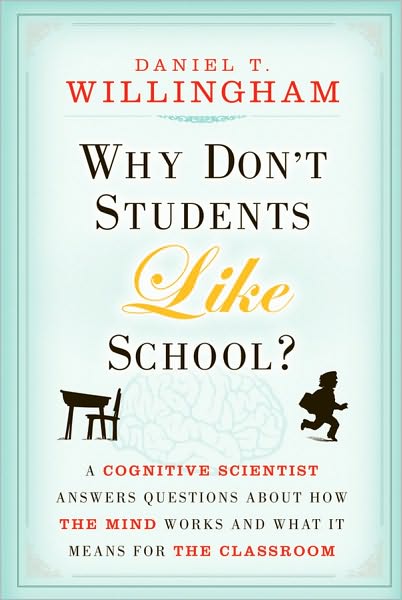Books about the cognitive aspects of teaching and learning abound. Many provide a great deal of information, but just are not very readable. Others are very readable, but just do not provide much in the way of substance that can clearly impact classroom practice and student learning. Willingham’s book Why Don’t Students Like School? does both of these. He provides readers with a readable and sometimes entertaining text at the same time he provides cognitive principles with examples that can be taken directly to the classroom. This book would actually make an excellent gift for any teacher.
The Nine Principles of Mind described by Willingham in this book include those listed in the chart below.
| Principle | Description |
| People are naturally curious, but they are not naturally good thinkers. | Basically, according to Willingham, the human brain is just not good at thinking because it is unreliable and takes a lot of time. Our minds are just not designed for it. |
| Factual knowledge precedes skill. | This principle describes what most educators know. Students have to have things to think about, so there is a time and place for learning facts and rote material. |
| Memory is the residue of thought. | This principle means that if we want students to learn something, we have to get them thinking about it. |
| We understand new things in the context of things we already know. | For those who have studied reading strategies, this principle makes sense. Background knowledge is vital to understanding. |
| Proficiency requires practice. | This principle is the old distributed practice rule. If we want students to get proficient at something, we have to provide opportunities for practice distributed over time. |
| Cognition is fundamentally different early and late in training. | For those who believe it is possible to teach students how to be historians, scientists, or mathematicians, you would disagree with this principle. According to Willingham, students are incapable of being experts in these areas because it takes years of training and practice to become experts. Instead, we need to seek to provide our students with “deep understandings of content.” |
| Children are more alike than different in terms of learning. | Those who advocate teaching to learning styles and intelligences would take exception to this principle. Willingham suggests that attempts to address learning styles and intelligences actually do not improve students’ achievement. While he does not disagree with the need to differentiate for learning needs, he points out that a lot of energy is unnecessarily spent trying to teach learning styles when there is little research to support that these even exist. |
| Intelligence can be changed through sustained hard work. | This principle just makes sense. Students’ beliefs in their own lack of intelligence impacts their performance. Instead students need to be taught the value of hard work and how that can positively impact their achievement. |
| Teaching, like any complex, cognitive skill, must be practiced to be improved. | Experience alone does not make one a better teacher. Teaching and then getting feedback on that teaching is vital to improving practice. |
Willingham basically provides readers with an overview of nine main cognitive principals that can guide teaching the classroom. This book is an enlightening and enjoyable read. This book would make a great gift to a new teacher just embarking on his or her career.

No comments:
Post a Comment